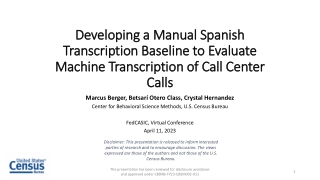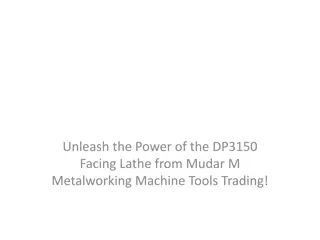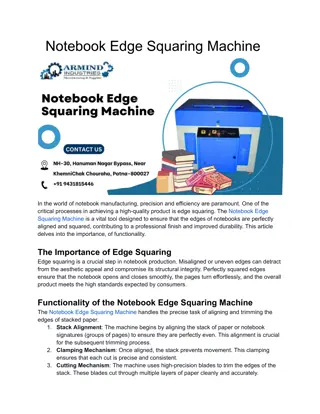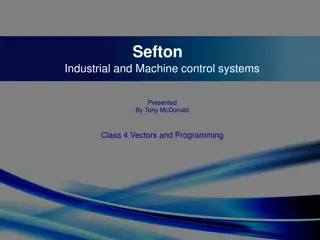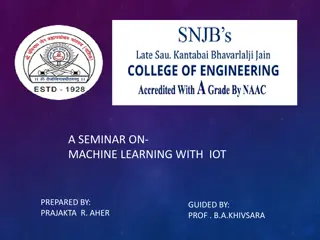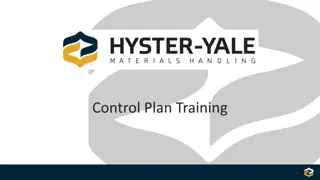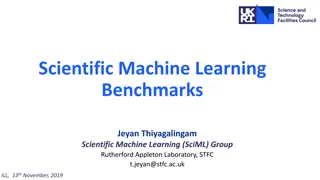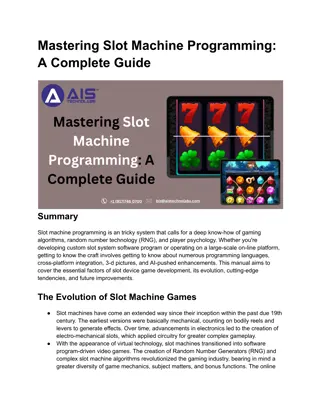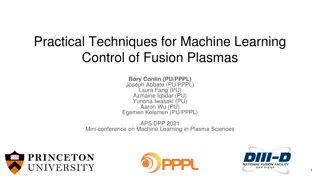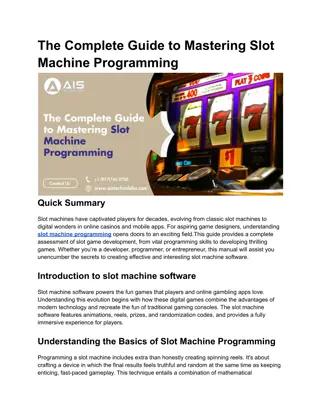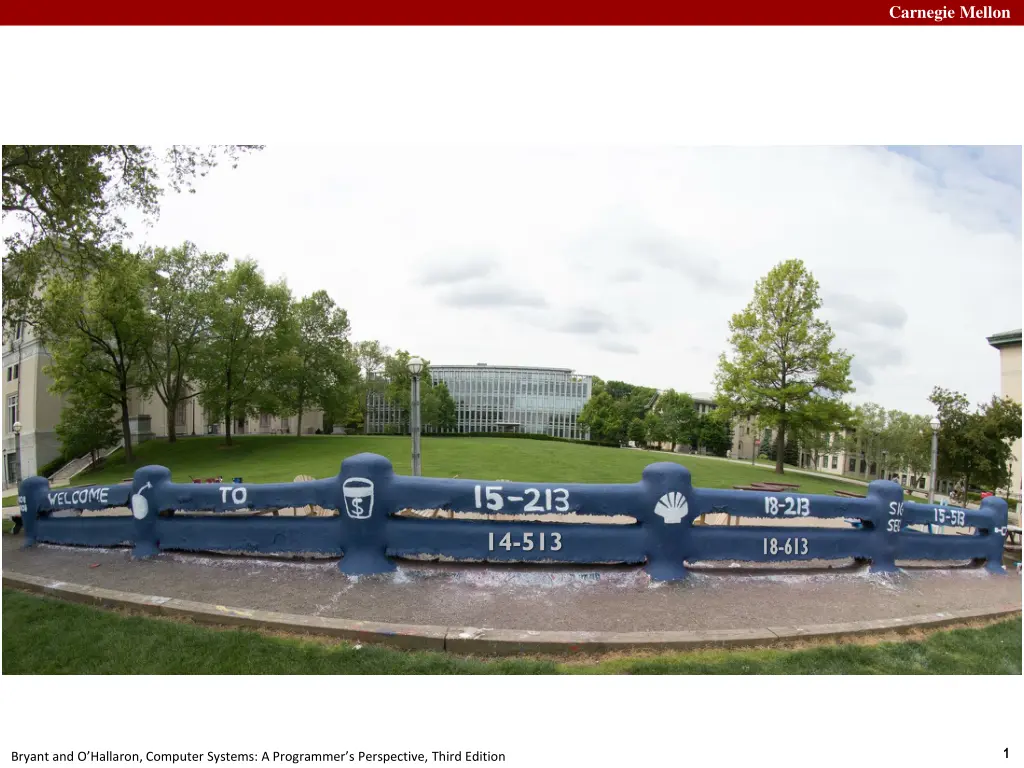
Carnegie Mellon Computer Systems Programming Insights
Explore the world of computer systems and programming through Carnegie Mellon University's detailed lectures on machine-level programming, memory operands, LEA instructions, and the significance of using LEA in CPU design. Delve into topics such as arithmetic expressions in ASM, assembly code, and machine code, as well as the practical applications of LEA in pointer calculations and arithmetic operations.
Download Presentation

Please find below an Image/Link to download the presentation.
The content on the website is provided AS IS for your information and personal use only. It may not be sold, licensed, or shared on other websites without obtaining consent from the author. If you encounter any issues during the download, it is possible that the publisher has removed the file from their server.
You are allowed to download the files provided on this website for personal or commercial use, subject to the condition that they are used lawfully. All files are the property of their respective owners.
The content on the website is provided AS IS for your information and personal use only. It may not be sold, licensed, or shared on other websites without obtaining consent from the author.
E N D
Presentation Transcript
Carnegie Mellon 14-513 18 18- -613 613 1 Bryant and O Hallaron, Computer Systems: A Programmer s Perspective, Third Edition
Carnegie Mellon Machine-Level Programming II: Control 15-213/18-213/14-513/15-513/18-613: Introduction to Computer Systems 6th Lecture, February 18, 2021 2 Bryant and O Hallaron, Computer Systems: A Programmer s Perspective, Third Edition
Carnegie Mellon Announcements Lab 1 (datalab) Due Thurs, Feb. 18, 11:59pm ET (that s today!) Written Assignment 1 peer grading Due Wed, Feb. 24, 11:59pm ET Written Assignment 2 available on Canvas Due Wed, Feb. 24, 11:59pm ET Lab 2 (bomblab) will be available at midnight via Autolab Due Tues, March 2, 11:59 pm ET 3 Bryant and O Hallaron, Computer Systems: A Programmer s Perspective, Third Edition
Carnegie Mellon Recap of Tuesday Reviewing LEA (based on after-class questions) Reviewing Arithmetic Expressions in ASM C -> Assembly -> Machine Code 4 Bryant and O Hallaron, Computer Systems: A Programmer s Perspective, Third Edition
Carnegie Mellon Memory operands and LEA In most instructions, a memory operand accesses memory Assembly C equivalent mov 6(%rbx,%rdi,8), %ax ax = *(rbx + rdi*8 + 6) add 6(%rbx,%rdi,8), %ax ax += *(rbx + rdi*8 + 6) xor %ax, 6(%rbx,%rdi,8) *(rbx + rdi*8 + 6) ^= ax LEA is special: it doesn t access memory Assembly C equivalent lea 6(%rbx,%rdi,8), %rax rax = rbx + rdi*8 + 6 5 Bryant and O Hallaron, Computer Systems: A Programmer s Perspective, Third Edition
Carnegie Mellon Why use LEA? CPU designers intended use: calculate a pointer to an object An array element, perhaps For instance, to pass just one array element to another function Assembly C equivalent lea (%rbx,%rdi,8), %rax rax = &rbx[rdi] Compiler authors like to use it for ordinary arithmetic It can do complex calculations in one instruction It s one of the only three-operand instructions the x86 has It doesn t touch the condition codes (we ll come back to this) Assembly C equivalent lea (%rbx,%rbx,2), %rax rax = rbx * 3 6 Bryant and O Hallaron, Computer Systems: A Programmer s Perspective, Third Edition
Carnegie Mellon Arithmetic Expression Example arith: leaq (%rdi,%rsi), %rax addq %rdx, %rax leaq (%rsi,%rsi,2), %rdx salq $4, %rdx leaq 4(%rdi,%rdx), %rcx imulq %rcx, %rax ret long arith (long x, long y, long z) { long t1 = x+y; long t2 = z+t1; long t3 = x+4; long t4 = y * 48; long t5 = t3 + t4; long rval = t2 * t5; return rval; } Interesting Instructions leaq: addition and/or multiplication by a constant salq: shift imulq: multiplication Curious: only used once 7 Bryant and O Hallaron, Computer Systems: A Programmer s Perspective, Third Edition
Carnegie Mellon Arithmetic Expression Example arith: leaq (%rdi,%rsi), %rax # t1 addq %rdx, %rax # t2 leaq (%rsi,%rsi,2), %rdx salq $4, %rdx # t4 leaq 4(%rdi,%rdx), %rcx # t5 imulq %rcx, %rax # rval ret long arith (long x, long y, long z) { long t1 = x+y; long t2 = z+t1; long t3 = x+4; long t4 = y * 48; long t5 = t3 + t4; long rval = t2 * t5; return rval; } Register Use(s) %rdi Argument x %rsi Argument y %rdx Argument z, t4 t1, t2, rval %rax %rcx t5 8 Bryant and O Hallaron, Computer Systems: A Programmer s Perspective, Third Edition
Carnegie Mellon Sidebar: instruction suffixes Most x86 instructions can be written with or without a suffix imul %rcx, %rax imulq %rcx, %rax There s no difference! The suffix indicates the operation size b=byte, w=short, l=int, q=long If present, must match register names Assembly output from the compiler (gcc S) usually has suffixes Disassembly dumps (objdump d, gdb disas ) usually omit suffixes Intel s manuals always omit the suffixes 9 Bryant and O Hallaron, Computer Systems: A Programmer s Perspective, Third Edition
Carnegie Mellon Turning C into Object Code Code in files p1.c p2.c Compile with command: gcc Og p1.c p2.c -o p Use basic optimizations (-Og) [New to recent versions of GCC] Put resulting binary in file p text C program (p1.c p2.c) Compiler (gcc Og -S) Asm program (p1.s p2.s) text Assembler (gcc or as) binary Object program (p1.o p2.o) Static libraries (.a) Linker (gcc or ld) binary Executable program (p) 10 Bryant and O Hallaron, Computer Systems: A Programmer s Perspective, Third Edition
Carnegie Mellon Compiling Into Assembly C Code (sum.c) long plus(long x, long y); Generated x86-64 Assembly sumstore: pushq %rbx movq %rdx, %rbx call plus movq %rax, (%rbx) popq %rbx ret void sumstore(long x, long y, long *dest) { long t = plus(x, y); *dest = t; } Obtain (on shark machine) with command gcc Og S sum.c Produces file sum.s Warning: Will get very different results on non-Shark machines (Andrew Linux, Mac OS-X, ) due to different versions of gcc and different compiler settings. 11 Bryant and O Hallaron, Computer Systems: A Programmer s Perspective, Third Edition
Carnegie Mellon gcc S output has lots of directives .globl sumstore .type sumstore, @function sumstore: .LFB35: .cfi_startproc pushq %rbx .cfi_def_cfa_offset 16 .cfi_offset 3, -16 movq %rdx, %rbx call plus movq %rax, (%rbx) popq %rbx .cfi_def_cfa_offset 8 ret .cfi_endproc .LFE35: .size sumstore, .-sumstore 12 Bryant and O Hallaron, Computer Systems: A Programmer s Perspective, Third Edition
Carnegie Mellon gcc S output has lots of directives .globl sumstore .type sumstore, @function sumstore: .LFB35: .cfi_startproc pushq %rbx .cfi_def_cfa_offset 16 .cfi_offset 3, -16 movq %rdx, %rbx call plus movq %rax, (%rbx) popq %rbx .cfi_def_cfa_offset 8 ret .cfi_endproc .LFE35: .size sumstore, .-sumstore You can ignore most lines that start with a . sumstore: pushq %rbx movq %rdx, %rbx call plus movq %rax, (%rbx) popq %rbx ret 13 Bryant and O Hallaron, Computer Systems: A Programmer s Perspective, Third Edition
Carnegie Mellon Object Code Assembly instructions become machine instructions Placeholders for unknown addresses 0000000000400595 <sumstore>: 400595: 53 push %rbx 400596: 48 89 d3 mov %rdx,%rbx 400599: e8 f2 ff ff ff callq <plus> 40059e: 48 89 03 mov %rax,(%rbx) 4005a1: 5b pop %rbx 4005a2: c3 retq Disassembler objdump d sum Useful tool for examining object code Analyzes bit pattern of series of instructions Produces approximate rendition of assembly code 14 Bryant and O Hallaron, Computer Systems: A Programmer s Perspective, Third Edition
Carnegie Mellon Today Control: Condition codes Conditional branches Loops Switch Statements 15 Bryant and O Hallaron, Computer Systems: A Programmer s Perspective, Third Edition
Carnegie Mellon Processor State (x86-64, Partial) Information about currently executing program Temporary data ( %rax, ) Location of runtime stack ( %rsp ) Location of current code control point ( %rip, ) Status of recent tests ( CF, ZF, SF, OF ) Registers %rax %rbx %rcx %rdx %rsi %rdi %r8 %r9 %r10 %r11 %r12 %r13 %r14 %r15 %rsp %rbp Instruction pointer %rip Current stack top Condition codes CF ZF SF OF 16 Bryant and O Hallaron, Computer Systems: A Programmer s Perspective, Third Edition
Carnegie Mellon Condition Codes (Implicit Setting) Single bit registers CF Carry Flag (for unsigned) SF Sign Flag (for signed) ZF Zero Flag OF Overflow Flag (for signed) Implicitly set (as side effect) of arithmetic operations Example: addqSrc,Dest t = a+b CF set if carry/borrow out from most significant bit (unsigned overflow) ZF set if t == 0 SF set if t < 0 (as signed) OF set if two s-complement (signed) overflow (a>0 && b>0 && t<0) || (a<0 && b<0 && t>=0) Not set by lea instruction 17 Bryant and O Hallaron, Computer Systems: A Programmer s Perspective, Third Edition
Carnegie Mellon ZF set when 000000000000 00000000000 18 Bryant and O Hallaron, Computer Systems: A Programmer s Perspective, Third Edition
Carnegie Mellon SF set when yxxxxxxxxxxxx... + yxxxxxxxxxxxx... 1xxxxxxxxxxxx... For signed arithmetic, this reports when result is a negative number 19 Bryant and O Hallaron, Computer Systems: A Programmer s Perspective, Third Edition
Carnegie Mellon CF set when 1xxxxxxxxxxxx... Carry + 1xxxxxxxxxxxx... xxxxxxxxxxxxx... 1 0xxxxxxxxxxxx... 1 Borrow - 1xxxxxxxxxxxx... 1xxxxxxxxxxxx... For unsigned arithmetic, this reports overflow 20 Bryant and O Hallaron, Computer Systems: A Programmer s Perspective, Third Edition
Carnegie Mellon OF set when a yxxxxxxxxxxxx... + yxxxxxxxxxxxx... b t zxxxxxxxxxxxx... z = ~y (a>0 && b>0 && t<0) || (a<0 && b<0 && t>=0) For signed arithmetic, this reports overflow 21 Bryant and O Hallaron, Computer Systems: A Programmer s Perspective, Third Edition
Carnegie Mellon Condition Codes (Explicit Setting: Compare) Explicit Setting by Compare Instruction cmpqSrc2, Src1 cmpq b,a like computing a-b without setting destination CF set if carry/borrow out from most significant bit (used for unsigned comparisons) ZF set if a == b SF set if (a-b) < 0 (as signed) OF setif two s-complement (signed) overflow (a>0 && b<0 && (a-b)<0) || (a<0 && b>0 && (a-b)>0) 22 Bryant and O Hallaron, Computer Systems: A Programmer s Perspective, Third Edition
Carnegie Mellon Condition Codes (Explicit Setting: Test) Explicit Setting by Test instruction testqSrc2, Src1 testq b,a like computing a&b without setting destination Sets condition codes based on value of Src1 & Src2 Useful to have one of the operands be a mask ZF set when a&b == 0 SF set when a&b < 0 Very often: testq %rax,%rax 23 Bryant and O Hallaron, Computer Systems: A Programmer s Perspective, Third Edition
Carnegie Mellon Condition Codes (Explicit Reading: Set) Explicit Reading by Set Instructions setX Dest: Set low-order byte of destination Dest to 0 or 1 based on combinations of condition codes Does not alter remaining 7 bytes of Dest SetX sete setne sets setns setg setge setl setle seta setb Condition ZF ~ZF SF ~SF ~(SF^OF)&~ZF ~(SF^OF) SF^OF (SF^OF)|ZF ~CF&~ZF CF Description Equal / Zero Not Equal / Not Zero Negative Nonnegative Greater (signed) Greater or Equal (signed) Less (signed) Less or Equal (signed) Above (unsigned) Below (unsigned) 24 Bryant and O Hallaron, Computer Systems: A Programmer s Perspective, Third Edition
Carnegie Mellon Explicit Reading Condition Codes (Cont.) SetX Instructions: Set single byte based on combination of condition codes One of addressable byte registers Does not alter remaining bytes Typically use movzbl to finish job 32-bit instructions also set upper 32 bits to 0 Register Use(s) int lt (long x, long y) { return x > y; } %rdi Argument x %rsi Argument y %rax Return value cmpq setl movzbl %al, %eax ret %rsi, %rdi # Compare x:y %al # Set when < # Zero rest of %rax 25 Bryant and O Hallaron, Computer Systems: A Programmer s Perspective, Third Edition
Carnegie Mellon Example: setl (Signed <) Condition: SF^OF SF OF SF ^ OF Implication 0 0 0 No overflow, so SF implies not < No overflow, so SF implies < 1 0 1 Overflow, so SF implies negative overflow, i.e. < 0 1 1 1 1 0 Overflow, so SF implies positive overflow, i.e. not < negative overflow case a 1xxxxxxxxxxxx... - 0xxxxxxxxxxxx... b t 0xxxxxxxxxxxx... 26 Bryant and O Hallaron, Computer Systems: A Programmer s Perspective, Third Edition
Carnegie Mellon x86-64 Integer Registers %rax %r8 %al %r8b %rbx %r9 %bl %r9b %rcx %r10 %cl %r10b %rdx %r11 %dl %r11b %rsi %r12 %sil %r12b %rdi %r13 %dil %r13b %rsp %r14 %spl %r14b %rbp %r15 %bpl %r15b Can reference low-order byte 27 Bryant and O Hallaron, Computer Systems: A Programmer s Perspective, Third Edition
Carnegie Mellon An x86-64 quirk to watch out for Most instructions with a 32-bit destination zero the upper 32 bits of the register! movzbl %al, %eax %rax 00 00 00 00 %eax 00 00 00 %al %al Zapped to 0 Zero extended from %al 28 Bryant and O Hallaron, Computer Systems: A Programmer s Perspective, Third Edition
Carnegie Mellon Today Control: Condition codes Conditional branches Loops Switch Statements 29 Bryant and O Hallaron, Computer Systems: A Programmer s Perspective, Third Edition
Carnegie Mellon Jumping jX Instructions Jump to different part of code depending on condition codes Implicit reading of condition codes jX jmp je jne js jns jg jge jl jle ja jb Condition 1 ZF ~ZF SF ~SF ~(SF^OF)&~ZF ~(SF^OF) SF^OF (SF^OF)|ZF ~CF&~ZF CF Description Unconditional Equal / Zero Not Equal / Not Zero Negative Nonnegative Greater (signed) Greater or Equal (signed) Less (signed) Less or Equal (signed) Above (unsigned) Below (unsigned) 30 Bryant and O Hallaron, Computer Systems: A Programmer s Perspective, Third Edition
Carnegie Mellon Conditional Branch Example (Old Style) Generation shark> gcc Og -S fno-if-conversion control.c Get to this shortly absdiff: cmpq %rsi, %rdi # x:y, x-y jle .L4 movq %rdi, %rax subq %rsi, %rax ret .L4: # x <= y movq %rsi, %rax subq %rdi, %rax ret long absdiff (long x, long y) { long result; if (x > y) result = x-y; else result = y-x; return result; } Register Use(s) %rdi Argument x %rsi Argument y %rax Return value 31 Bryant and O Hallaron, Computer Systems: A Programmer s Perspective, Third Edition
Carnegie Mellon Expressing with Goto Code C allows goto statement Jump to position designated by label long absdiff_j (long x, long y) { long result; int ntest = (x <= y); if (ntest) goto Else; result = x-y; goto Done; Else: result = y-x; Done: return result; } long absdiff (long x, long y) { long result; if (x > y) result = x-y; else result = y-x; return result; } 32 Bryant and O Hallaron, Computer Systems: A Programmer s Perspective, Third Edition
Carnegie Mellon General Conditional Expression Translation (Using Branches) C Code val = Test ? Then_Expr : Else_Expr; val = x>y ? x-y : y-x; Goto Version ntest = !Test; if (ntest) goto Else; val = Then_Expr; goto Done; Else: val = Else_Expr; Done: . . . Create separate code regions for then & else expressions Execute appropriate one 33 Bryant and O Hallaron, Computer Systems: A Programmer s Perspective, Third Edition
Carnegie Mellon Using Conditional Moves Conditional Move Instructions Instruction supports: if (Test) Dest Src Supported in post-1995 x86 processors GCC tries to use them C Code val = Test ? Then_Expr : Else_Expr; But, only when known to be safe Goto Version result = Then_Expr; eval = Else_Expr; nt = !Test; if (nt) result = eval; return result; Why? Branches are very disruptive to instruction flow through pipelines Conditional moves do not require control transfer 34 Bryant and O Hallaron, Computer Systems: A Programmer s Perspective, Third Edition
Carnegie Mellon Conditional Move Example long absdiff (long x, long y) { long result; if (x > y) result = x-y; else result = y-x; return result; } Register Use(s) %rdi Argument x %rsi Argument y %rax Return value absdiff: movq subq movq subq cmpq cmovle ret %rdi, %rax %rsi, %rax %rsi, %rdx %rdi, %rdx %rsi, %rdi %rdx, %rax # x # result = x-y When is this bad? # eval = y-x # x:y # if <=, result = eval 35 Bryant and O Hallaron, Computer Systems: A Programmer s Perspective, Third Edition
Carnegie Mellon Bad Cases for Conditional Move Expensive Computations val = Test(x) ? Hard1(x) : Hard2(x); Bad Performance Both values get computed Only makes sense when computations are very simple Risky Computations val = p ? *p : 0; Both values get computed Unsafe May have undesirable effects Computations with side effects val = x > 0 ? x*=7 : x+=3; Illegal Both values get computed Must be side-effect free 36 Bryant and O Hallaron, Computer Systems: A Programmer s Perspective, Third Edition
Carnegie Mellon Exercise SetX sete setne sets setns setg setge setl setle seta setb Condition ZF ~ZF SF ~SF ~(SF^OF)&~ZF ~(SF^OF) SF^OF (SF^OF)|ZF ~CF&~ZF CF Description Equal / Zero Not Equal / Not Zero Negative Nonnegative Greater (signed) Greater or Equal (signed) Less (signed) Less or Equal (signed) Above (unsigned) Below (unsigned) cmpq b,a like computing a-b w/o setting dest CF set if carry/borrow out from most significant bit (used for unsigned comparisons) ZF set if a == b SF set if (a-b) < 0 (as signed) OF set if two s-complement (signed) overflow %rax 0x0000 0000 0000 0000 0xFFFF FFFF FFFF FFFF 0xFFFF FFFF FFFF FFFF 0xFFFF FFFF FFFF FF01 0x0000 0000 0000 0001 SF 0 1 1 1 1 CF 0 1 0 0 0 OF 0 0 0 0 0 ZF 1 0 0 0 0 xorq %rax, %rax subq $1, %rax cmpq $2, %rax setl %al movzbl %al, %eax Note: setl and movzbl do not modify condition codes 37 Bryant and O Hallaron, Computer Systems: A Programmer s Perspective, Third Edition
Carnegie Mellon Exercise SetX sete setne sets setns setg setge setl setle seta setb Condition ZF ~ZF SF ~SF ~(SF^OF)&~ZF ~(SF^OF) SF^OF (SF^OF)|ZF ~CF&~ZF CF Description Equal / Zero Not Equal / Not Zero Negative Nonnegative Greater (signed) Greater or Equal (signed) Less (signed) Less or Equal (signed) Above (unsigned) Below (unsigned) cmpq b,a like computing a-b w/o setting dest CF set if carry/borrow out from most significant bit (used for unsigned comparisons) ZF set if a == b SF set if (a-b) < 0 (as signed) OF set if two s-complement (signed) overflow %rax 0x0000 0000 0000 0000 0xFFFF FFFF FFFF FFFF 0xFFFF FFFF FFFF FFFF 0xFFFF FFFF FFFF FF01 0x0000 0000 0000 0001 SF 0 1 1 1 1 CF 0 1 0 0 0 OF 0 0 0 0 0 ZF 1 0 0 0 0 xorq %rax, %rax subq $1, %rax cmpq $2, %rax setl %al movzbl %al, %eax Note: setl and movzblq do not modify condition codes 38 Bryant and O Hallaron, Computer Systems: A Programmer s Perspective, Third Edition
Carnegie Mellon Today Control: Condition codes Conditional branches Loops Switch Statements 39 Bryant and O Hallaron, Computer Systems: A Programmer s Perspective, Third Edition
Carnegie Mellon Do-While Loop Example C Code long pcount_do (unsigned long x) { long result = 0; do { result += x & 0x1; x >>= 1; } while (x); return result; } Goto Version long pcount_goto (unsigned long x) { long result = 0; loop: result += x & 0x1; x >>= 1; if(x) goto loop; return result; } Count number of 1 s in argument x( popcount ) Use conditional branch to either continue looping or to exit loop 40 Bryant and O Hallaron, Computer Systems: A Programmer s Perspective, Third Edition
Carnegie Mellon Do-While Loop Compilation long pcount_goto (unsigned long x) { long result = 0; loop: result += x & 0x1; x >>= 1; if(x) goto loop; return result; } Register Use(s) %rdi Argument x %rax result movl $0, %eax .L2: movq andl $1, %edx addq %rdx, %rax shrq %rdi jne .L2 rep; ret # result = 0 # loop: %rdi, %rdx # t = x & 0x1 # result += t # x >>= 1 # if(x) goto loop 41 Bryant and O Hallaron, Computer Systems: A Programmer s Perspective, Third Edition
Carnegie Mellon Quiz Time! Check out: https://canvas.cmu.edu/courses/17808 42 Bryant and O Hallaron, Computer Systems: A Programmer s Perspective, Third Edition
Carnegie Mellon General Do-While Translation Goto Version loop: Body if (Test) goto loop C Code do Body while (Test); { Statement1; Statement2; Statementn; } Body: 43 Bryant and O Hallaron, Computer Systems: A Programmer s Perspective, Third Edition
Carnegie Mellon General While Translation #1 Jump-to-middle translation Used with -Og Goto Version goto test; loop: Body test: if (Test) goto loop; done: While version while (Test) Body 44 Bryant and O Hallaron, Computer Systems: A Programmer s Perspective, Third Edition
Carnegie Mellon While Loop Example #1 C Code long pcount_while (unsigned long x) { long result = 0; while (x) { result += x & 0x1; x >>= 1; } return result; } Jump to Middle Version long pcount_goto_jtm (unsigned long x) { long result = 0; goto test; loop: result += x & 0x1; x >>= 1; test: if(x) goto loop; return result; } Compare to do-while version of function Initial goto starts loop at test 45 Bryant and O Hallaron, Computer Systems: A Programmer s Perspective, Third Edition
Carnegie Mellon General While Translation #2 While version while (Test) Body Do-while conversion Used with O1 Goto Version if (!Test) goto done; loop: Body if (Test) goto loop; done: Do-While Version if (!Test) goto done; do Body while(Test); done: 46 Bryant and O Hallaron, Computer Systems: A Programmer s Perspective, Third Edition
Carnegie Mellon While Loop Example #2 C Code long pcount_while (unsigned long x) { long result = 0; while (x) { result += x & 0x1; x >>= 1; } return result; } Do-While Version long pcount_goto_dw (unsigned long x) { long result = 0; if (!x) goto done; loop: result += x & 0x1; x >>= 1; if(x) goto loop; done: return result; } Initial conditional guards entrance to loop Compare to do-while version of function Removes jump to middle. When is this good or bad? 47 Bryant and O Hallaron, Computer Systems: A Programmer s Perspective, Third Edition
Carnegie Mellon For Loop Form General Form Init i = 0 for (Init; Test; Update ) Test i < WSIZE Body #define WSIZE 8*sizeof(int) long pcount_for (unsigned long x) { size_t i; long result = 0; for (i = 0; i < WSIZE; i++) { unsigned bit = (x >> i) & 0x1; result += bit; } return result; } Update i++ Body { unsigned bit = (x >> i) & 0x1; result += bit; } 48 Bryant and O Hallaron, Computer Systems: A Programmer s Perspective, Third Edition
Carnegie Mellon For Loop For Version While Loop for (Init; Test; Update) Body While Version Init; while (Test ) { Body Update; } 49 Bryant and O Hallaron, Computer Systems: A Programmer s Perspective, Third Edition
Carnegie Mellon For-While Conversion Init long pcount_for_while (unsigned long x) { size_t i; long result = 0; i = 0; while (i < WSIZE) { unsigned bit = (x >> i) & 0x1; result += bit; i++; } return result; } i = 0 Test i < WSIZE Update i++ Body { unsigned bit = (x >> i) & 0x1; result += bit; } 50 Bryant and O Hallaron, Computer Systems: A Programmer s Perspective, Third Edition

